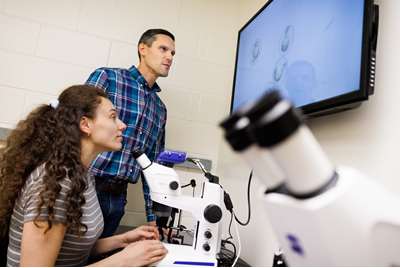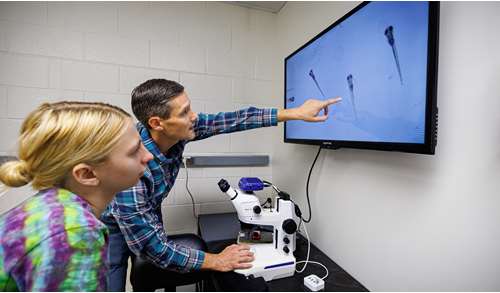Miesfeld Laboratory

Preventing Blindness by Untangling the Genetic Network of Vision Neurons
Research Areas
Retinal Ganglion Cell Genesis and Survival
Retinal ganglion cells are the first-born retinal neurons, important for driving retinal progenitor cell proliferation and their axons form the optic nerve, which serves as a path for migrating astrocytes that promote development of the definitive retinal vasculature. Disrupted RGC genesis is a major cause of congenital blindness. RGCs are essential for vision because they transmit all visual stimuli from the eye to the brain and are the pathogenic target in glaucoma. It is important for vision scientists to understand the mechanisms controlling RGC birth and survival, in order to generate RGCs in vitro for cell transplantation (restoring vision) – and RGC maintenance, in order to prevent degeneration (protecting vision). For this, our lab is investigating the transcription factors, co-activators, co-repressors, and chromatin modifiers contributing to the neural retina/RGC gene regulatory network.
 |
| Embryonic day 14.5 mouse cryosection labeling retinal progenitor cells, Atoh7+ cells, and RGC axons. |
 |
| Identification of Pax6+ and Atoh7+ cells in the developing zebrafish retina. |
Glaucoma
The Glaucomas are a complex group of ocular neurodegenerative diseases affecting the health of the optic nerve and RGC survival, resulting in blindness from optic nerve atrophy. Most people who develop glaucoma have no known genetic link and do not always share the same set of common risk factors, making it difficult to predict who will develop the disease. Therefore, it is important to assess the susceptibility to develop RGC degeneration using unique combinations of known glaucoma risk factors, such as high intraocular pressure and RGC number. To do so we are utilizing our Atoh7 allelic series, which results in a diminished RGC genesis and ultimately a significant reduction of mature RGCs accompanied by secondary defects to retinal vasculature and axon fasciculation.
 |
| RGC axons (green) and retinal vasculature (magenta). |
 |
| Loss of Rbpms+ RGCs in the Atoh7 allelic series. Adapted from Miesfeld et. al. PNAS 2020. |
Laboratory Photos


Meet Our Team

Joel B. Miesfeld, PhD
Assistant Professor of Ophthalmology & Visual Sciences; Assistant Professor of Cell Biology, Neurobiology and Anatomy

Antonia Amidon
Graduate Student

Darby Bennett
Year Entered MCW: 2023

Alex Gallo
Graduate Student

Richard Rausch
Research Technologist I
Our Alumni
Mariah Rossebo
Mason Thao
Funding
Get Involved
Support the Miesfeld Laboratory
The Miesfeld Lab could not exist without the generosity and support of many foundations, federal agencies and individual donors. Funds donated to the program are used to acquire new equipment and research consumables, to help train students and fellows, to enable the presentation of our research findings at scientific meetings and to fund positions for support staff.Donate Now
Join our Team
We are always looking for enthusiastic candidates with strong communication skills and lab experience. We encourage high school students, undergraduate students, graduate students, post doc, and medical students to browse our website and learn more about our research. We also have available positions for laboratory and animal technologists.Current Openings
We do not have any open positions at this time. Please check back soon!
Resources for Interested Candidates
UndergraduateProgram for Undergraduate Research Experience (PURE)
Summer Program for Undergraduate Research (SPUR)
Graduate
School of Graduate Studies (PhD Program)
Medical
Medical Student Summer Research Program (MSSRP)
Physician Scientist Pathway
Other area institutions
Marquette University, Milwaukee School of Engineering, University of Wisconsin, Milwaukee. These institutions offer collaborative undergraduate and graduate research programs.
Recent Publications
-
The rax homeobox gene is mutated in the eyeless axolotl, Ambystoma mexicanum.
(Davis ES, Voss G, Miesfeld JB, Zarate-Sanchez J, Voss SR, Glaser T.) Dev Dyn. 2021 Jun;250(6):807-821 PMID: 32864847 PMCID: PMC8907009 08/31/2020
-
(Miesfeld JB, Ghiasvand NM, Marsh-Armstrong B, Marsh-Armstrong N, Miller EB, Zhang P, Manna SK, Zawadzki RJ, Brown NL, Glaser T.) Proc Natl Acad Sci U S A. 2020 Sep 01;117(35):21690-21700 PMID: 32817515 PMCID: PMC7474671 08/21/2020
-
(Clark BS, Miesfeld JB, Flinn MA, Collery RF, Link BA.) Front Cell Dev Biol. 2020;8:608112 PMID: 33634099 PMCID: PMC7900515 SCOPUS ID: 2-s2.0-85101223534 02/27/2021
-
Eye organogenesis: A hierarchical view of ocular development.
(Miesfeld JB, Brown NL.) Curr Top Dev Biol. 2019;132:351-393 PMID: 30797514 02/25/2019
-
Yap regulates glucose utilization and sustains nucleotide synthesis to enable organ growth.
(Cox AG, Tsomides A, Yimlamai D, Hwang KL, Miesfeld J, Galli GG, Fowl BH, Fort M, Ma KY, Sullivan MR, Hosios AM, Snay E, Yuan M, Brown KK, Lien EC, Chhangawala S, Steinhauser ML, Asara JM, Houvras Y, Link B, Vander Heiden MG, Camargo FD, Goessling W.) EMBO J. 2018 Nov 15;37(22) PMID: 30348863 PMCID: PMC6236334 SCOPUS ID: 2-s2.0-85055253100 10/24/2018
-
Rbpj direct regulation of Atoh7 transcription in the embryonic mouse retina.
(Miesfeld JB, Moon MS, Riesenberg AN, Contreras AN, Kovall RA, Brown NL.) Sci Rep. 2018 Jul 05;8(1):10195 PMID: 29977079 PMCID: PMC6033939 07/07/2018
-
Feedback between tissue packing and neurogenesis in the zebrafish neural tube.
(Hiscock TW, Miesfeld JB, Mosaliganti KR, Link BA, Megason SG.) Development. 2018 May 04;145(9) PMID: 29678815 PMCID: PMC5992593 SCOPUS ID: 2-s2.0-85046850961 04/22/2018
-
(Miesfeld JB, Glaser T, Brown NL.) Gene Expr Patterns. 2018 Jan;27:114-121 PMID: 29225067 PMCID: PMC5835195 12/12/2017
-
Yap and Taz regulate retinal pigment epithelial cell fate.
(Miesfeld JB, Gestri G, Clark BS, Flinn MA, Poole RJ, Bader JR, Besharse JC, Wilson SW, Link BA.) Development. 2015 Sep 01;142(17):3021-32 PMID: 26209646 PMCID: PMC4582179 SCOPUS ID: 2-s2.0-84940754780 07/26/2015
-
YAP is essential for tissue tension to ensure vertebrate 3D body shape.
(Porazinski S, Wang H, Asaoka Y, Behrndt M, Miyamoto T, Morita H, Hata S, Sasaki T, Krens SFG, Osada Y, Asaka S, Momoi A, Linton S, Miesfeld JB, Link BA, Senga T, Shimizu N, Nagase H, Matsuura S, Bagby S, Kondoh H, Nishina H, Heisenberg CP, Furutani-Seiki M.) Nature. 2015 May 14;521(7551):217-221 PMID: 25778702 PMCID: PMC4720436 SCOPUS ID: 2-s2.0-84929315796 03/18/2015
-
(Miesfeld JB, Link BA.) Mech Dev. 2014 Aug;133:177-88 PMID: 24560909 PMCID: PMC4138299 SCOPUS ID: 2-s2.0-84908158843 02/25/2014
-
(Clark BS, Cui S, Miesfeld JB, Klezovitch O, Vasioukhin V, Link BA.) Development. 2012 May;139(9):1599-610 PMID: 22492354 PMCID: PMC3317966 SCOPUS ID: 2-s2.0-84859297815 04/12/2012
Contact Us
Miesfeld Lab
(414) 955-7836

